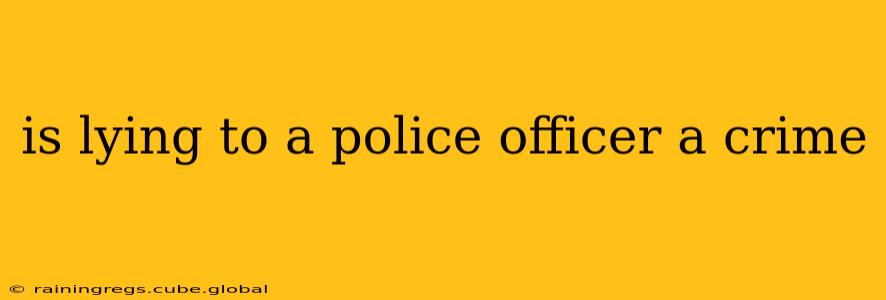Is Lying to a Police Officer a Crime? A Comprehensive Guide
Lying to a police officer is a complex issue, and whether or not it's a crime depends heavily on the context. While simply being untruthful isn't always illegal, providing false statements under certain circumstances can lead to serious legal consequences. Let's delve into the specifics.
What Constitutes Lying to a Police Officer?
This isn't simply about telling a "white lie." The act of lying to a police officer becomes legally problematic when it actively obstructs an investigation, provides false information under oath, or involves specific types of deception outlined in relevant laws. The key factors include:
- The context of the interaction: Were you being questioned as a witness, a suspect, or simply during a routine stop? The severity of the potential consequences varies greatly depending on this context.
- The nature of the lie: A minor misstatement versus a deliberate attempt to mislead investigators can carry significantly different penalties.
- The jurisdiction: Laws regarding false statements to law enforcement vary by state and country. Some jurisdictions have specific statutes addressing this behavior.
What are the legal implications of lying to law enforcement?
This is where things get nuanced. The specific charge and resulting penalties depend heavily on the circumstances and local laws. Potential charges could include:
- Obstruction of justice: This is a serious charge, often carrying significant penalties, that occurs when you actively impede a law enforcement investigation. Lying is a common way to obstruct justice.
- Perjury: This is the act of lying under oath, typically in a court of law, but can also apply to sworn statements given to police officers. Perjury carries severe penalties, including jail time.
- False statements: Many jurisdictions have laws specifically prohibiting the making of false statements to law enforcement officers, regardless of whether it's under oath. The penalties can range from fines to imprisonment, depending on the severity of the lie and its impact on the investigation.
What if I accidentally lied to a police officer?
Accidental misstatements are usually treated differently than deliberate lies. If you realize you’ve made a mistake, immediately correct it and be transparent with the officer. This can significantly reduce the potential consequences. However, it's crucial to remember that even an accidental lie can still impact the investigation and may be interpreted negatively.
Can I refuse to answer questions from a police officer?
In most jurisdictions, you have the right to remain silent and refuse to answer questions from a police officer, except in specific circumstances, such as when you are under arrest. It is best to clearly and politely state that you wish to exercise your right to remain silent and to consult with an attorney before answering any questions.
What should I do if I'm questioned by a police officer?
If you are questioned by a police officer, it’s best practice to:
- Remain calm and polite.
- Be truthful and accurate in your answers.
- Clearly state if you need a lawyer.
- Don't volunteer information beyond what is asked.
Is there a difference between lying to a federal agent versus a local police officer?
Yes, there can be. Federal laws, such as 18 U.S. Code § 1001, specifically prohibit making false statements to federal officers. These laws often have stricter penalties than state-level laws concerning false statements to local police.
Disclaimer: This information is for educational purposes only and does not constitute legal advice. If you have been accused of lying to a police officer, you should immediately consult with a qualified attorney in your jurisdiction. The laws governing this matter are complex and vary greatly depending on the specific facts and circumstances of your case.
